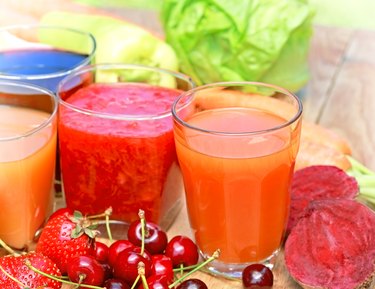
In moderation, fresh juice can be a nutritious addition to your diet. It's a concentrated source of essential vitamins, minerals and phytochemicals that can help you meet your recommended intake of fruits and vegetables. In the long term, however, juice fasting is not a healthy approach to nutrition. If you drink only juice and don't eat whole foods, you run the risk of not getting enough of some important nutrients, including fiber, and this can lead to constipation.
Juicing Fiber Facts
Video of the Day
When you juice fruits and vegetables, you remove the pulp, or "roughage." The roughage is indigestible in your body, but it plays certain important roles in your health. A whole medium apple has 4.4 grams of fiber, while a cup of apple juice only has 0.5 gram. Some juices do contain a little more fiber -- for example, a cup of carrot juice has 1.9 grams of fiber -- but not enough to make any sizable dent in your daily fiber needs and prevent the negative effects associated with a low fiber intake.
Video of the Day
Benefits of Fiber
Your body can't digest fiber, which means it travels through your gastrointestinal system largely unchanged. This helps push food through your intestinal tract so waste can exit your body. Fiber also adds bulk and softness to your stool to make it easier to pass. People who don't consume enough fiber risk experiencing constipation, which is defined as having three or fewer bowel movements each week or having stool that is hard and difficult to pass.
Your Daily Needs and Sources
To prevent constipation, you should eat a balanced diet composed of whole foods and strive to meet your daily recommended fiber intake. Women between the ages of 19 and 50 need 25 grams of fiber each day, while men of the same age need 38 grams. Women and men over 50 need slightly less -- 21 and 30 grams, respectively. Eat plenty of fresh fruits and vegetables and whole grains, including whole-wheat, brown rice and oats, to get all the fiber you need.
Other Drawbacks of Juicing
In the long term, drinking only juice also puts you at risk of becoming deficient in other key nutrients, such as protein and healthy fats. You need protein for muscle growth and maintenance, and you need healthy fats to support brain function. Furthermore, fruit juice is a concentrated source of sugar and calories. A medium apple provides 95 calories, while a cup of apple juice has 114 calories. Although this doesn't seem like a big difference, the calories can add up over time. Also, because you're just drinking the juice and not consuming the filling fiber, you're likely to feel unsatisfied, and this can cause you to consume more calories.
- CNN: Juicing: Healthy Detox or Diet Trap?
- FamilyDoctor.org: Nutrition for Weight Loss: What You Need to Know About Fad Diets
- USDA National Nutrient Database: Apples, Raw, With Skin
- USDA National Nutrient Database: Apple Juice, Canned or Bottled, Unsweetened, Without Added Ascorbic Acid A
- USDA National Nutrient Database: Carrot Juice, Canned
- Gannett Health Services: Fiber, Digestion, and Health
- National Digestive Diseases Information Clearinghouse: Constipation
- Institute of Medicine: Dietary Reference Intakes: Macronutrients